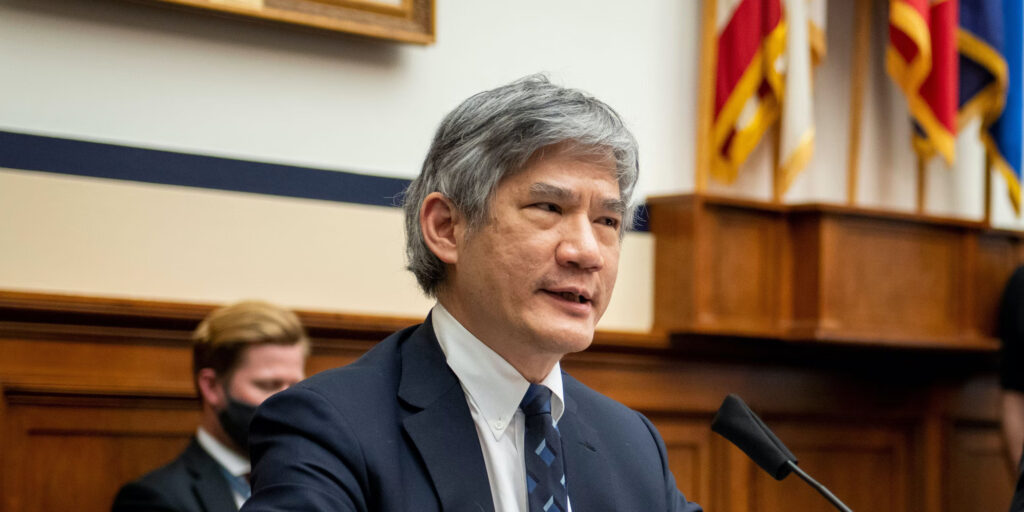White House-Linked Venture Capital Fund Boasts China War Would Be Great for Business
CAPITALISM, 13 Feb 2023
Sam Biddle | The Intercept - TRANSCEND Media Service
A representative from America’s Frontier Fund said that a “kinetic event” in the Pacific would be very good for its bottom line.

Gilman Louie, America’s Frontier Fund’s co-founder and CEO, responds to questions during a House Armed Services Committee in Washington, D.C., on March 12, 2021. Photo: Rod Lamkey/CNP
3 Feb 2023 – A war between China and Taiwan will be extremely good for business at America’s Frontier Fund, a tech investment outfit whose co-founder and CEO sits on both the State Department Foreign Affairs Policy Board and President Joe Biden’s Intelligence Advisory Board, according to audio from a February 1 event.
The remarks occurred at a tech finance symposium hosted at the Manhattan offices of Silicon Valley Bank. According to attendee Jack Poulson, head of the watchdog group Tech Inquiry, an individual who identified himself as “Tom” attended the event in place of Jordan Blashek, America’s Frontier Fund’s president and chief operating officer.
Following the panel discussion, “Tom” spoke with a gaggle of other attendees and held forth on AFF’s investment in so-called choke points: sectors that would spike in value during a volatile geopolitical crisis, like computer chips or rare earth minerals. It turns out, according to audio published by Poulson, that a war in the Pacific would be tremendous for AFF’s bottom line.
“If the China-Taiwan situation happens, some of our investments will 10x, like overnight.”
“If the China-Taiwan situation happens, some of our investments will 10x, like overnight,” the person who identified as “Tom” said. “So I don’t want to share the name, but the one example I gave was a critical component that … the total market value is $200 million, but it is a critical component to a $50 billion market cap. That’s like a choke point, right. And so if it’s only produced in China, for example, and there’s a kinetic event in the Pacific, that would 10x overnight, like no question about it. There’s a couple of different things like that.”
AFF is surely not the only venture fund that would see stratospheric returns throughout their portfolio in the case of a destabilizing global crisis, like a “kinetic event in the Pacific” — that is to say, war. Unlike most other investment firms, though, AFF is closely tied to the upper echelons of American power, the very people who would craft any response to such a war.
Gilman Louie, AFF’s co-founder and current CEO, serves as chair of the National Intelligence University, advises Biden through his Intelligence Advisory Board, and was tapped for the State Department’s Foreign Affairs Policy Board by Secretary of State Antony Blinken in 2022. Louie previously ran In-Q-Tel, the CIA’s venture capital arm.
In other words, AFF stands to massively profit from a geopolitical crisis while its CEO advises the Biden administration on geopolitical crises. (America’s Frontier Fund did not respond to a request for comment.)
AFF was founded in 2021, according to its website, “to build the companies, platforms, and capabilities that will generate once-in-a-generation returns for investors, while ensuring long-term economic competitiveness for the U.S. and its allies.” Last year, the New York Times reported the techno-nationalist fund had met with U.S. lawmakers to request a $1 billion injection. AFF currently leads the Quad Investor Network, a White House-sponsored alliance of investors from the so-called Quad: a geopolitical bloc aimed at countering Chinese hegemony constituted by the U.S., Australia, India, and Japan.
The fund also has close ties to some of the American private sector’s most vocal and influential China hawks. AFF was founded last year with support from former Google CEO Eric Schmidt, whose closeness to Biden’s government is attracting growing scrutiny and skepticism, and investor Peter Thiel. Thiel and Schmidt, whose business interests in national security and defense both stand to profit immensely from war in the Pacific, have both advocated for a more hostile national stance toward China.
Schmidt is particularly dedicated to China alarmism, having spent much of his post-Google career thus far drumming up anti-China tensions; first at the National Security Commission on Artificial Intelligence, which he chaired, and today through his new think tank, the Special Competitive Studies Project, which regularly depicts China as a direct threat to the United States.
AFF’s own Schmidt connections run deep: Louie, the CEO, worked alongside Schmidt at the National Security Commission on Artificial Intelligence, while Balshek, the fund’s COO, was previously an executive at Schmidt’s philanthropic fund.
_____________________________________________
 Sam Biddle – sam.biddle@theintercept.com
Sam Biddle – sam.biddle@theintercept.com
Tags: Capitalism, Corruption, Elites, Finance, Greed, Hunger, Inequality, Post-capitalism, Profits, Right to Food, Super rich, World Order
DISCLAIMER: The statements, views and opinions expressed in pieces republished here are solely those of the authors and do not necessarily represent those of TMS. In accordance with title 17 U.S.C. section 107, this material is distributed without profit to those who have expressed a prior interest in receiving the included information for research and educational purposes. TMS has no affiliation whatsoever with the originator of this article nor is TMS endorsed or sponsored by the originator. “GO TO ORIGINAL” links are provided as a convenience to our readers and allow for verification of authenticity. However, as originating pages are often updated by their originating host sites, the versions posted may not match the versions our readers view when clicking the “GO TO ORIGINAL” links. This site contains copyrighted material the use of which has not always been specifically authorized by the copyright owner. We are making such material available in our efforts to advance understanding of environmental, political, human rights, economic, democracy, scientific, and social justice issues, etc. We believe this constitutes a ‘fair use’ of any such copyrighted material as provided for in section 107 of the US Copyright Law. In accordance with Title 17 U.S.C. Section 107, the material on this site is distributed without profit to those who have expressed a prior interest in receiving the included information for research and educational purposes. For more information go to: http://www.law.cornell.edu/uscode/17/107.shtml. If you wish to use copyrighted material from this site for purposes of your own that go beyond ‘fair use’, you must obtain permission from the copyright owner.